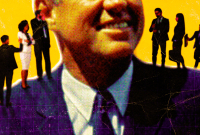Support strong Canadian climate journalism for 2025
The current “cooling-off” period for lobbyists in Canada is already too short, according to dozens of organizations. Now, proposed rule changes could mean even less time between a lobbyist campaigning to elect a politician and then seeking to influence them.
As of now, a lobbyist who works on a politician’s election campaign can’t contact them for a full election cycle afterwards to avoid politicians feeling obligated to help people who have helped them. Lobbying commissioner Nancy Bélanger is proposing a switch: two years for lobbyists who work closely with a candidate (say, on a fundraising campaign) and one year for lobbyists who are less involved (who canvass, for example).
On Thursday, Democracy Watch, Climate Action Network and other civil society groups sent a joint open letter to Bélanger voicing concern over the reduced cooling-off period, which they say opens the door to unethical lobbying.
Bélanger has suggested a slew of other shifts to the Lobbyists’ Code of Conduct — including more stringent rules around gift-giving — which the groups say don’t address conflicts of interest. She also proposed more rules around who lobbyists can seek to influence, placing limits on business partners and other close relationships.
“Groups with more than one million supporters are jointly calling on the federal commissioner of lobbying to do the right thing and stop gutting key lobbying ethics rules in ways that will allow for corrupt favour-trading in federal politics that has been illegal since 1997,” said Duff Conacher, co-founder of Democracy Watch.
“The lobbying commissioner is contradicting herself,” Conacher argued. One proposed rule change would ban lobbyists from giving public office-holders gifts and hospitality worth more than $30 a year. Meanwhile, he said, Bélanger is “gutting other rules to allow lobbyists to raise thousands of dollars and campaign for politicians and then lobby the politicians for return favours soon afterwards.”
The public consultations around the changes ended this week. In May, Bélanger told Canada’s National Observer updates to the code would be in place by the end of the year.
On Monday, the lobbying commissioner told the Globe and Mail she is “extremely committed to getting this code right … completely realizing that there’ll be some that believe that I’m not going far enough and others that will think that I go too far.”
To Conacher, the only way to get it right would be to increase the cooling-off period to 10 years for lobbyists heavily involved with a politician and five years for ones who are less involved.
“Prime Minister Trudeau and any of his cabinet ministers and MPs who were first elected in 2015 clearly still owe the people who fundraised or campaigned for them in any way to help them first win power, as does every other party leader and MP still owe everyone who first helped them win election,” reads part of the letter.
“They wouldn't have the pay, perks or power they have today if they had not won that first election.”






Comments
Lobbying, is by definition unethical. It involves the intentional attempt to tilt the table tn the interests of one's self, or one's employer. Using whatever means are available, including illegalities like bribery and corruption Lobbyists sole purpose is to achieve favorable conditions and legislation from various levels of government.
When not accompanied by financial inducements, lobbying can be a legitimate exercise in informing and persuading. The exchange of monetary or other financial inducements turns the activity into tne ancient source of the phrase "the love of money is the root of all evil". The modern world seems to be entirely lubricated by the love of money.